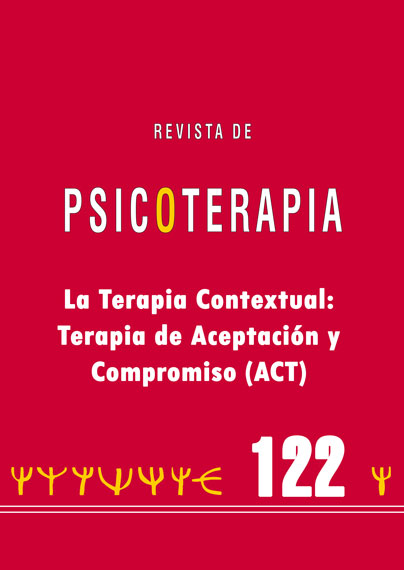Efficacy of acceptance and commitment therapy focused on repetitive negative thinking in fibromyalgia: A randomized multiple-baseline design
DOI:
https://doi.org/10.33898/rdp.v33i122.1150Keywords:
fibromyalgia, acceptance and commitment therapy, repetitive negative thinking, worry, emotional symptomatologyAbstract
Repetitive negative thinking (RNT), in the form of worry and rumination, is a factor that can have a negative impact on the quality of life and symptomatology of patients with fibromyalgia (FM). The present study analyzes the efficacy of a brief Acceptance and Commitment Therapy (ACT) protocol focused on reducing RNT in four women diagnosed with FM. A randomized, multiple-baseline design across participants was conducted. Participants completed 4-6 weeks of baseline and subsequently received a 4-session individual intervention. The effect of the intervention was assessed by conducting follow-ups for up to 3 months. All four participants showed clinically significant changes in emotional symptoms as measured by the Depression Anxiety and Stress Scale – 21 (DASS-21¸ S. H. Lovibond y P. F. Lovibond, 1995) and the General Health Questionnaire – 12 (Ruiz et al., 2017a). Likewise, participants showed significant improvements in parameters related to sleep quality and improvements in health-related quality of life. As for process measures, all participants showed clinically significant changes in pathological worry, and three of them also in cognitive fusion. Changes in valued actions were more modest. Effect sizes comparable across designs were very large and statistically significant for DASS-Total (d = 1.51), DASS-Depression (d = 1.83), pathological worry (d = 1.79), and cognitive fusion (d = 1.99). These results suggest that brief RNT-focused ACT interventions hold promise for intervention in patients with FM.
Downloads
Downloads
Published
How to Cite
Issue
Section
License
Authors who publish in this journal accept the following conditions:
-
Authors retain copyright and grant the journal the right of first publication, with the work registered under the Creative Commons CC-BY-NC 4.0 International license. This license allows third parties to cite the text and use it without alteration and for non-commercial purposes, provided they credit the authorship of the work and its first publication in this journal.
-
Authors may enter into other independent and additional contractual agreements for the non-exclusive distribution of the version of the article published in this journal (e.g., including it in an institutional repository or publishing it in a book), provided they clearly indicate that the work was first published in this journal.
-
The views expressed in the articles are solely the responsibility of the authors and in no case do they reflect the opinions or scientific policies of the journal.









